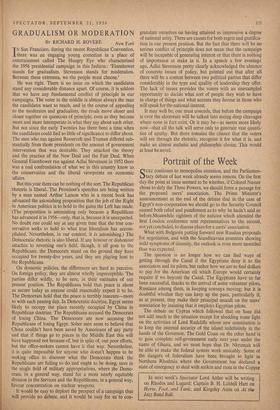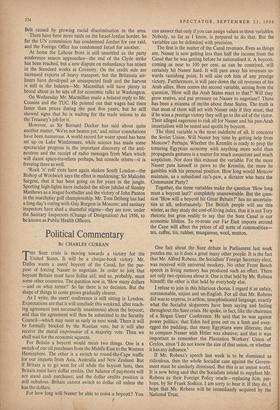Portrait of the Week
eUE2 continues to monopolise attention, and the Parliamen- tary debate of last week already seems remote. On the first day the point at issue seemed to be whether, if Colonel Nasser chose to defy the Three Powers, we should force a passage for the proposed users' association. The Prime Minister's announcement at the end of the debate that in the case of Egypt's non-cooperation we should go to the Security Council caused both relief and puzzlement as to why he hadn't said so before.Meanwhile eighteen of the nations which attended the first London conference sent representatives to the second, not yet concluded, to discuss plans for a users' association.
What with Bulganin putting forward new Russian proposals for negotiation, and with the Scandinavian countries showing mild symptoms of disunity, the outlook is even more unsettled than was expected.
The question is no longer how we can find ways of getting through the Canal if the Egyptians deny it to the association and its pilots, but rather how we are to find dollars to pay for the American oil which Europe would certainly require if we boycott the Canal. The Egyptians have so far been successful, thanks to the arrival of some volunteer pilots, Russians among them, in keeping convoys moving; but it is doubtful whether they can keep up the pace, particularly if, as at present, they make their principal assault on the users' association by insisting that it employs Egyptian pilots.
The debate on Cyprus which followed that on Suez did not add much to the situation except for shedding some light on the activities of Lord Radcliffe whose new constitution is to keep the internal security of the island indefinitely in the hands of the Governor. The Gold Coast on the other hand is to gain complete self-government early next year under the name of Ghana, and we must hope that Dr. Nkrumah will be able to make the federal system work amicably. Some of the dangers of federalism have been brought to light in Northern Rhodesia where the Government has declared a state of emergency to deal with strikes and riots in the Copper In next week's Spectator Lord Attlee will be writing on Rhodes and Lugard; Captain B. H. Liddell Hart on Horse, Foot, and Tank; and Kingsley Amis on At the Jazz Band Ball. Belt caused by growing racial discrimination in the area.
There have been more raids on the Israel-Jordan border. So far the UN commission has condemned Jordan for one raid, and the Foreign Office has condemned Israel for another.
At home the Labour front is still unsettled as the party conference season approaches—the end of the Clyde strike has been reached, but a new dispute on redundancy has arisen in the Standard works at Coventry. On the credit side are increased exports of heavy transport, but the Britannia air- liners have developed an unsuspected fault and the harvest is still in the balance—Mr. Macmillan will have plenty to brood about as he sets off for economic talks in Washington.
On Wednesday Mr. Macmillan made a belated reply to Mr. Cousins and the TUC. He pointed out that wages had risen faster than prices during the past five years; but he still showed signs that he is waiting for the trade unions to do the Treasury's job for it.
However, as Sir Bernard Docker has said about quite another matter, 'We're not beaten yet,' and minor consolations have been numerous. A world record for water speed has been set up on Lake Windermere, while science has made some spectacular progress in the important discovery of the anti- neutron and the receipt of radio messages from Mars which will daunt space-travellers perhaps, but console others—it is freezing there as well.
`Rock 'n' roll' riots have again shaken South London—the Bishop of Woolwich says the effect is maddening; Sir Malcolm Sargent, that it has been going on for years in the jungle. Sporting high-lights have included the silver jubilee of Stanley Matthews as a league footballer and the victory of John Panton in the matchplay golf championship. Mr. Tom Driberg has had a long day's outing with Guy Burgess in Moscow; and sanitary inspectors have shed a shameful stigma—they are now, under the Sanitary Inspectors (Change of Designation) Act 1956, to be known as Public Health Officers.



































 Previous page
Previous page